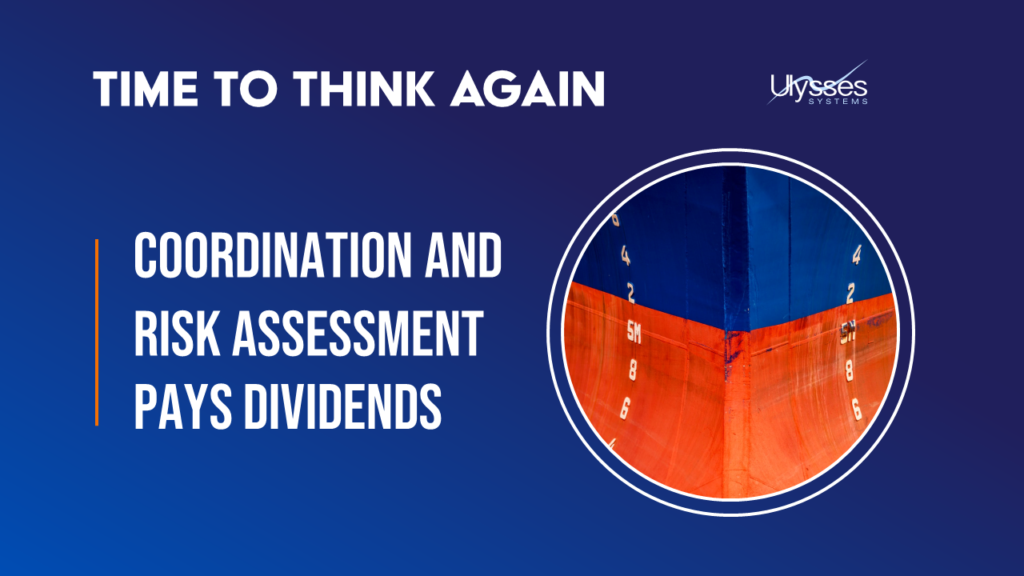
TIME TO THINK AGAIN!
We think the time to reconsider is here! And to shout out that software can be much more than a good reporting and compliance tool. Because if shipping software does not help the maritime enterprise with coordination and risk avoidance, then its contribution to the industry is slight. Whereas shipping software should be heavy lifting.
Ulysses Systems is a software company, which, from inception twenty-nine years ago, deeply cares about the shipping industry. And Task Assistant® solutions are designed to do the heavy lifting the marine enterprise needs, dynamically.
Coordination and risk avoidance software pays dividends
And we firmly maintain that coordination and risk avoidance software exists and, above, all pays dividends. Furthermore, we feel it highly likely that top executives in shipping regret the gap they perceive in software offerings. And that they long to see solutions that actively handle coordination and risk avoidance.
Is Silicon Valley gospel?
In many Ulysses Systems newsletters we ask the question: Is Silicon Valley gospel? It’s a simple question, not meant to provoke or show irreverence; that’s not our intention. It’s a practical question and has to do the business model one chooses in order to sell software.
In a few words, can Silicon Valley provide close to turn-key solutions for the marine domain or do they provide foundational tools aimed at all industries and no particular one? In fact, does Silicon-Valley acknowledge the need for an industry-specific focus, domain by domain? Or do they relegate domain focus to costly customisations, which, experience has shown, cause massive trouble when upgrading.
The Silicon Valley business model
So, does the Silicon Valley business model work in shipping? No, it doesn’t! Shipping doesn’t benefit from the Silicon Valley business model because there are major blank spots in digital competence. And the reason Silicon Valley sells the software while keeping the blank spots blank, is because this serves their business model of selling foundational tools and letting customisations fill the gaps.
Is software in shipping only about record keeping and compliance?
The dominant perception in shipping is that software is only about record keeping and compliance. Certainly, good record-keeping and compliance are prominent enterprise goals. And by avoiding omissions, record keeping for compliance and for financial control can save the shipping company a percentage of revenue.
So, record-keeping saves a percentage of revenue, but it does so in a bureaucratic sense. And this is one reason that owners and top executive take little interest in software. Record-keeping, however, should not have to be bureaucratic.

Twice the value
But who in the shipping industry doubts that we can save at least twice the value saved from compliance and financial control, by better management of the thousands of co-ordination and risk-intense processes that happen under duress. Yet, few people believe that software can help in this area.
Time to think again
So, it’s time to think again and revisit which software can, and which software cannot bring meaningful value to the enterprise.
Our position: by ignoring assisted co-ordination and risk avoidance, companies risk losing 70% of digitization value coming from digital transformation. This significant 70% of value gained through digitization is none other than the value of preventing co-ordination and execution errors.
So, it would be an omission for a maritime enterprise not to consider savings from coordination and risk avoidance assistance. In fact, value from optimising shipping operations ought to be added to the value gained by good reporting and compliance.
Let’s not forget that shipping is dynamic and there is never enough staff. And anticipating risk and maximizing co-ordination is also dynamic. Furthermore, it is well within the competencies of software.

So, perhaps the time to think again involves considering software developments that factor in dynamic risk anticipation and maximisation of co-ordination. We feel it highly likely that top executives in shipping regret the gap they perceive in software offerings. And that they long to see solutions that go beyond compliance and record keeping. Solutions that can actively handle coordination and risk avoidance.
Software that pays dividends
Consequently, coordination and risk avoidance software will unfailingly pay dividends.
There is an obstacle, however, which is that people in the shipping industry tend to mistrust software. Panteleimon Pantelis, Ulysses systems COO explains why. “The reason people don’t believe in software is that it does not care about their processes and stories.”
To conclude, let’s return to the Silicon Valley business model for selling software. And consider it from a maritime industry view regarding value. Clearly, the Silicon Valley business model prioritizes uniformity over “caring about processes and stories’ of the domain. So, divergence is perceived as a deviation from the one-size-fits-all approach and as an opportunity to charge heavy consultancy services. And then, when system upgrades are necessary, charging again for consultancy services to restore customisations, making for a prohibitively expensive upgrade process.
It seems, then, that we need to navigate towards a different business model, more suited to the maritime sector.
Ulysses Systems is a software company, which, from inception twenty-nine years ago, deeply cares about the shipping industry. And Task Assistant® solutions dynamically perform the heavy lifting the marine enterprise needs.
